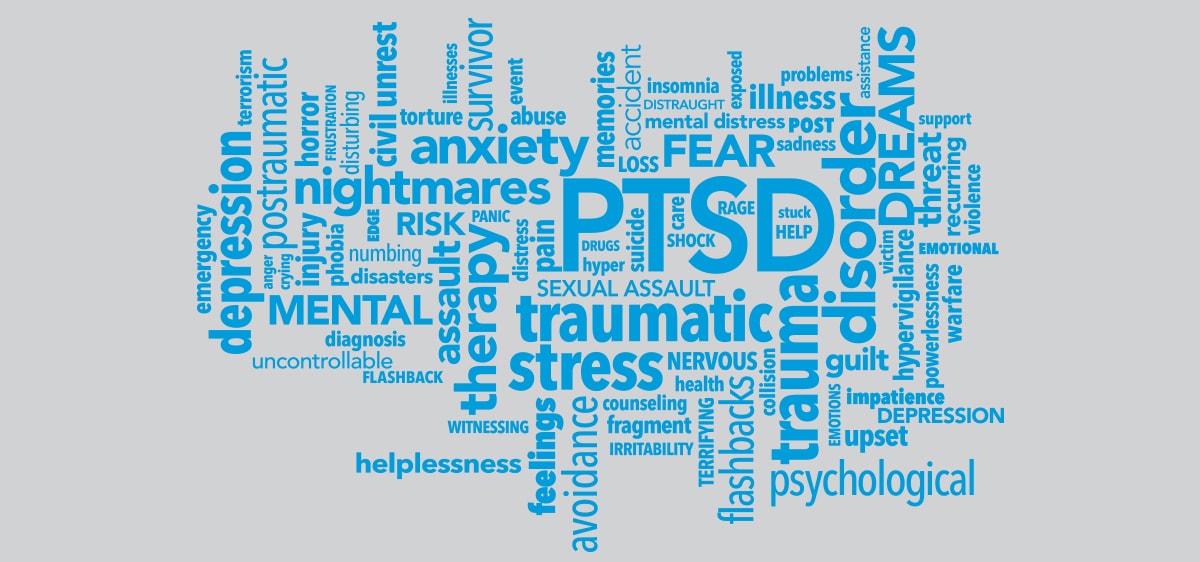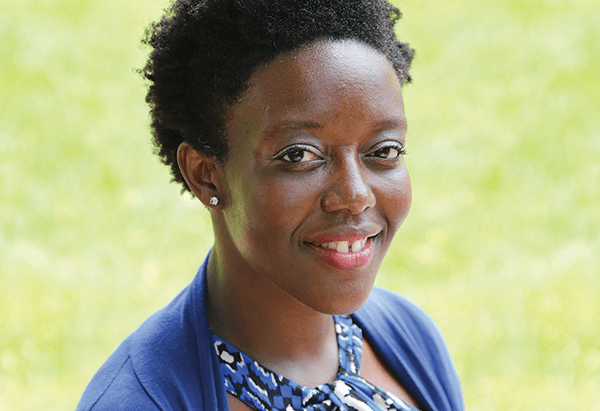[vc_row][vc_column][vc_column_text]

[/vc_column_text][/vc_column][/vc_row][vc_row el_class=”hero-header-text”][vc_column][vc_column_text]
When Trauma Gets Personal
The emotional cost of disasters, conflict, abuse, and other crises is sometimes hidden. What can we do to help Survivors?
by Elizabeth o. Pierre | April 3, 2018
[/vc_column_text][/vc_column][/vc_row][vc_row][vc_column][vc_column_text]
One of my greatest pet peeves is when students or clients question whether or not they are “crazy” after they have experienced a traumatic event or events in their lives. By crazy they often mean that they are not their normal selves. It is also an interesting way of minimizing what they have experienced. It can be hard to acknowledge the truth of the extent of one’s own suffering. They describe themselves as being anxious, irritable, hypervigilant, afraid, raging, often on the brink of tears, and/or depressed. These emotions emerge intermittently or they overwhelm them by coming out all at once. They are not crazy. Their emotions are actually a normal response to an event or events that have disrupted their internal and external world.
I find that Christians particularly have difficulty engaging and accepting the range of complex emotions after trauma. There is an inherent and possibly unconscious belief that their faith in God should be strong enough to withstand such multifaceted feelings. They are likely to turn to their faith and/or pastor to cope with trauma. Therefore, I want to offer some basic understanding of what trauma is, what one might expect after traumatic experiences, and how our churches might be supportive to those who are suffering in our midst.
Sixty to 80 percent of adults in the United States and in Europe have experienced at least one traumatic event. These include child maltreatment; physical, sexual, emotional, and psychological abuse; war and civil unrest; natural disasters; and life-threatening accidents. Given these statistics, our church communities are inevitably affected.
Trauma. We hear this word in various contexts but what is it exactly? For an event to be accurately described as traumatic it must entail the following: First, it is life-threatening, the person feels both psychologically and physically endangered, and it induces intense fear and helplessness. Second, there is overwhelming injury done to both the body and the mind. And third, trauma drastically affects how persons view themselves, the world, and God.
Trauma is an experience that dramatically alters one’s psychological, emotional, mental, and spiritual well-being. And when people don’t process their trauma, they “fragment”—they remain stuck in that traumatic experience. They become frozen in the time period when the event occurred. Some indicators of fragmentation are repetition in speech and behaviors and anxiety that reflect the traumatic event. The person is not necessarily deciding to stay frozen in place, but the traumatizing event was so extraordinary—so unexpected—that the brain literally cannot process it.
This is why people often complain about having nightmares, anxiety, depression, panic attacks, and/or rage. Certain sounds or smells will trigger a return to the trauma. Some people will avoid individuals or places connected with the trauma. Still others may have physical responses such as cold sweats, stuttering, migraines, or stomach pains. And some will turn to food, alcohol, or drugs to cope with the uncomfortable and painful feelings. Those who have experienced interpersonal violence (physical, sexual, emotional, psychological abuse) may continue to find themselves in relationships or communities that perpetrate the trauma. This is called re-victimization, and it can be hard for friends and family to understand.
“When memories of the trauma remain unprocessed, traumatized individuals tend to become like Pavlov dogs: Subtle reminders become conditioned stimuli for the re-experiencing of frightening feelings and perceptions belonging in the past,” writes renowned psychiatrist Bessel van der Kolk. These unprocessed memories tend to contribute to behaviors that lead to further re-victimization. Such individuals gravitate to what is familiar. If abuse has been the dominant feature of one’s history and they have not processed their abuse, they will find a way to work it through the relationship, however unhealthy it might be.
Finally, for some they may turn away from their faith because they find it difficult to engage a God who they believe caused their pain. Yet for others, their faith is renewed and they develop a deeper devotion to God, a phenomenon known as post-traumatic growth.
So what can you do when a friend, family member, or parishioner has experienced trauma? One of the first and most important things is to believe them and hold their experience without attempting to make meaning for them. This may seem obvious, but many people suffer alone because they fear that their stories will be disregarded or minimized. Many of them will struggle with anxiety, depression, and flashbacks. Some may
experience a crisis of faith. In our own anxiety to help and to offer care we may say something like, “Well, at least you are here.” Or, “It could have been much worse.” These statements take the focus away from the individual’s real pain and inadvertently shut them down. Staying with and holding someone’s story allows the person to fully be present with where they are on their journey. You don’t have to fix it or them.
Many people suffer alone because they fear that their stories will be disregarded or minimized.
For survivors of sexual violence, this is especially critical. There is so much shame connected to sexual violence that it takes great courage for a person to come to you. To not believe them or to minimize what they said is re-traumatizing. You can simply say, “I am so sorry this happened to you. How would you like me to journey with you?” Your presence, empathic ear, and your consistency of doing so makes all the difference because you create space for your friend/loved one to keep sharing.
Remember that people often remain stuck when the trauma remains unprocessed. Disclosure is key for people to get unstuck and to melt into their present reality. Disclosure simply is the telling and processing of the event. It is through the telling that re-integration occurs. In addition, disclosure provides relief of psychological symptoms.
Certainly, there will be a time for you to offer resources that may be in your church and your community. These are important for healing, too. However, your empathic relationship is necessary to support the other modes of recovery.
For pastors, you will have congregants who come from various traumatic backgrounds and develop a wide array of the symptoms mentioned. Remember, your congregants are more likely to turn to you for support, so your role is vital for their recovery. You do not need to have a clinical background in order for you and your church to embody God’s compassionate heart.
As a pastor you can create space within your congregation for people to feel safe enough to disclose. Recently, I visited two church services where during the sermon and prayer the pastors acknowledged people who may be suffering from trauma. I perked up because I rarely hear those words in a church service. It was a small thing, but for those in need the thought might be, “Maybe I can share my experience here.” Use your liturgy and preach about it. There are plenty of traumatic events in the Bible to talk about—as well as beautiful ways that God meets God’s people in the midst of their pain. At the end of the day, people are wondering if God remembers them and cares about the trauma they experienced. You have an opportunity every week to say that God does.
I tell students that I am not asking them to be therapists because the emotional work with any trauma survivor is arduous. But as pastors, you are usually the first go-to person—a very important beginning for a person’s recovery. And be sure to have referrals ready for local mental-health providers and support groups in your area.
Studies show that individuals are more inclined to resiliency after trauma if they have an extensive support system. Included in this social support are clergy and spiritual leaders who are deemed especially helpful. Women who receive healing responses and find ways for religious coping are more likely to thrive after sexual trauma. However, lack of support will most likely complicate the effects of the traumatic experience.
Most churches have some kind of structure for small groups. This is a wonderful support system that the church organically provides. Provide training for your lay leaders about trauma. (The National Center for Trauma Informed Care offers resources at www.nasmhpd.org. Search for “trauma-informed care.”) Again, they are not being called to do therapy, but knowledge from trainings can provide guidance and tools as to how to better support those in their group who have experienced trauma.
Finally, one cannot rush the process of recovery. Depending on the extent of the trauma and the age the trauma transpired, it will take time. God is patient with us. So learn to be patient with yourself and others.
Years ago while getting dinner ready for my niece and nephew, the fish sticks broke. I thought five-year-old Nia would be upset, but she looked up at me with her bright, brown eyes and said happily, “That’s okay, Aunty Betty. I like broken things.”
In that moment, I felt God saying the same thing to me: “Elizabeth, I like broken things, too.” I am not saying that God revels in our trauma and pain. This can’t be further from the truth. But God is not afraid to engage in the brokenness caused by our trauma. God does not minimize it or ignore it. The emotions that we experience on our journey of recovery are the stuff of life. And it is because of our faith in God that we can navigate them without shame because we have Immanuel who journeys faithfully with us.
[/vc_column_text][/vc_column][/vc_row][vc_row][vc_column][/vc_column][/vc_row][vc_row el_class=”cc-author-bio”][vc_column width=”1/4″][vc_column_text]
[/vc_column_text][/vc_column][vc_column width=”3/4″][vc_column_text]
About the Author
[/vc_column_text][vc_separator color=”black” style=”dotted”][vc_column_text]
Elizabeth O. Pierre teaches graduate courses at North Park Theological Seminary and North Park University’s School of Professional Studies. As an assistant professor of pastoral care, she is able to bring her background as a pastor into her classroom to share with her students. Elizabeth loves spending time with her family on the East Coast. She enjoys all kinds of food, especially when it’s spicy, and is always up for an adventure with God anywhere in the world.
[/vc_column_text][/vc_column][/vc_row]














